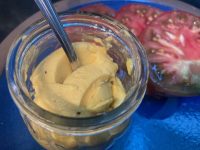An Interview with Bob Nueske
Ari recently had a chance to chat with renowned Wisconsin bacon maker Bob Nueske about the history of his family’s business.
Bob will be speaking at Zingerman’s 4th Annual Camp Bacon this summer. Please join us!
Bob Nueske’s great-grandfather came to the small town of Wittenberg, Wisconsin in 1882. Shortly thereafter he started to cure and smoke meats in the style of his German heritage. Located up near the UP, they’ve been making their bacon using basically the same family recipe for nearly a century and a half now. We’ve cooked off Nueske’s Applewood smoked bacon at the Deli every morning for over 31 years now. I have no idea how many tens of thousands of pounds it adds up to but I know it’s a lot. That record, like the bacon on which it’s based, is something special. So too is the man behind the bacon—Bob Nueske is a marvelous story teller, a very grounded and forward thinking business man, a “Small Giant” long before Bo Burlingham wrote the book, a master bacon maker and a bacon lover. We’re excited to have successfully enticed Bob to leave northern Wisconsin for the wilds of Ann Arbor and a few days at Camp Bacon.
Ari: Can you tell me a bit of the Nueske story?
Bob: I hardly know how to begin. When you’re born and raised into something that becomes your life it’s hard to know where to start. The only way I can explain it is that if you’re born in a cooler and raised in a smokehouse it permeates into your being and you don’t even realize it. I’ve been part of Nueske bacon literally my whole life.
And when you are born and raised in a family business, working as a father and son it makes a special situation. I had a good father. He smiled a lot. He was a good man and a good businessman. He was really firm and fair. And yet as a kid, you know, when you’re 16, 17, 18, and you have all the answers . . . when I was 16 years old . . . . Well, I’ll you a story. Back when I was 16 I had a car. Back then Wittenberg was a town of 895 people (Today, it’s totally taken off—the 2010 census said it had 1081 people). It’s all a farm community. I figured the best way for me to see the world was to head down to Chicago on my own. So I drove south. I got downtown by myself. I’d never been there. I was looking at all these great big buildings and I noticed there were a whole lot of good restaurants. But I couldn’t afford to eat in em. And I thought to myself, I’d love to understand ’em. Now, who’d have ever thought that bacon would take you to places like that? But today our bacon is in some of the best restaurants and stores in the country.
As I remember growing up, my dad had put four hours in at work by the time we kids got up in the morning. We were always eating the odd shaped pieces he didn’t want to sell to other people. My mother would say, “I’m married to the man who has the best bacon, but you always bring home the other stuff!” He’d say, “We don’t sell those odd cuts, we eat em. It tastes the same. It just don’t look the same!”
We have some pictures of me sitting on a truck with three birthday candles. When you’re little it seems like your parents are doing things you could never do. Then you get to the age when you think, “They don’t know anything.” But then eventually you realize that things that seemed big aren’t that big, they aren’t that important. And I realized that my dad knew what he was doing. In learning how to do a product like my dad taught us it was time consuming and it wasn’t like I took notes. Day in and day out you learn it and you don’t even know you’re learning it. But my dad had these little books that he used. And they weren’t just sitting on the shelf. They were well read, well worn. And he would take a lot of notes.
My dad was a good student of bacon. Making bacon like ours is like making fine wine. You don’t hurry the process. I remember him saying, “You know Bobby, we do it this way because of . . . . ., but, not this way because . . . ” There were good reasons why each piece of the process happened. I remember thinking “There has to be a faster quicker way to make bacon!” But eventually I realized that he really knew what he was doing.
Where did your grandfather come from?
He was from Germany. I’m still trying to figure out exactly where. I got drafted into the military got my medical training at Ft. Sam Houston and thought for sure I was headed for Vietnam. It was not a pretty time. But somehow I was the only one in our class that ended up stationed in Germany. So through a fluke of luck I learned the heritage of the meat. My great grandfather came to Wisconsin in 1882. Wilhelm Nueske. I’m still trying to find out what town he came from. No one really knows. We know it’s German heritage. I’m starting to discover that it was up in the northeast area of Germany and what’s now Poland. There are still some Nueskes up there. It’s not that common a name. I literally know most everyone of them in this country.
After I went through the military I went into the printing press business for a while. But then I came back to smoking meats and I began to experiment a little on my own, I realized that speeding things up, going fast just creates another me-too product. Volume and big is not what we’re after at Nueske’s. We don’t want to be the biggest. One of the best words I’ve learned over all these years is, “No.” When we’re approached by certain companies to sell to them we look at how they actually run their business. A lot of times I can see that we’re not large enough to produce enough for them so we say, “No.”
Speaking of which, you and I both read a lot of business books. Were there any that were particularly helpful to you?
I was remembering a book called Beyond World Class. It’s by Ross Alan. It was written about the way I think a business should be run. It said that if your suppliers don’t treat you like you wanted to be treated, and if someone in your company or a customer doesn’t fit the way you want to work, then you just say, “We’re not interested.” You just don’t stay with them. You need to work with people who care like you do and who want to work the way you do.
That’s a recipe for how to have fun while you’re running your company. You enjoy your relationship with everyone and you work with a great group of people. It takes work to keep it that way. But growing up in a company like ours . . . well, you know . . .
When I left the family business at 18 I had two really good experiences. One was in a small printing company. And then I was wooed away to American Can Company. It was a huge corporation. I actually got that feeling of putting your brains up on the time clock when you punched in. They didn’t want your thoughts. And then you picked them up when you left. They didn’t want you to think. I learned I could get done 8 hours work in 3 hours and kept pushin’. But then I was told “Don’t do that again.”
People that work here like what they do and they’re having fun. That’s the key. Many an outsider looking in at our company goes by and says, “How do you do this? How do you get your culture?” At first they think it was a trick, like when you used to go to Russia and they put on a stage Grand Tour to fool you. But after a while, the visitors realize there’s no “Grand Tour.” That’s the key. What your people do. How they smile. How they work. That’s what makes a great company. It just seems to work.
We love your bacon here at Zingerman’s. It’s gotten great press in the New York Times and just about everywhere else. What makes the bacon so great?
Well, what really makes the difference how the hogs are fed. How they’re grown. How they’re treated as far as stress. You don’t want stress in the hogs. You have to find companies who know how to slaughter and cut and sort correctly. And then how you cure and smoke the meat properly. We taste test constantly. Even though there are strict formulas, there’s still always the human side. If something doesn’t seem right when we taste the product we pull it off.
We all know that our bacon is a natural product and the whole production system can run a little off one way or another. Pretty much it means the standards of where you want it to be even though the flavor profile never changes. Something comes in wrong and you have to make a point and send it back. Consistency is key. Don’t accept anything that’s less than what you really want.
Our hogs are raised in Canada. They’re the Belgian Pietrain breed and some others. We cure the bellies and then give them 24 hours in the smoker. We use real Wisconsin Applewood. We actually have one man who’s responsible to select the Applewood. We buy full trees, not wood already cut in pieces. He actually cuts it as we need it. When you select the wood it has to be the right balance of dryness and greenness. Not too dry, not too green. We use wild Cherrywood and it’s the same thing there. We start with a full tree. We’re fortunate . . . when I think back when my grandparents moved here, we’re fortunate that they picked an area with so many apple and cherry orchards.
 It’s pretty impressive that Nueske’s has stayed small and focused for four generations. Why do you think it’s worked so well?
It’s pretty impressive that Nueske’s has stayed small and focused for four generations. Why do you think it’s worked so well?
Let me tell you another story. There’s a man around here who started a very large nationally known meat curing company around the time my father was getting going. He and my dad knew each other pretty well. The companies were just about 45 miles a part. Our location was on a dead end street. We didn’t really have a retail store. We just were wholesaler but my dad would let people in when they knocked on the door. Finally he put in a tiny little counter. Anyways, Fritz would come in to that little counter and buy our bacon and smoked liver sausage. “I said why are you buying our bacon when you have your own?” He said, “I want to buy the good stuff for our big shots coming up to my cottage up north.”
“Well, Fritz is probably in his 70s now. He came in one day quite a few years ago now and he asks one of the retail clerks in our shop, if I was there. I asked him the same question I would ask every time he came back when I was 14. “What are you doing buying bacon here?” And he said the same thing he said back then: “I’m going up to my cabin and need the good stuff.”
But then he said, “I want to tell you a story about your dad and me. You know, I would tell your dad, ‘Robert, I’m gonna build the biggest meat company I can. And your dad would look at me and say, ‘Well Fritz, I’m gonna become the best meat company I can become.'” Then Fritz said to me, “I succeeded. I sold out to a big company. I made a lot of money. But I don’t like what the big company did with our products. And you know what? Your dad was right and I was wrong. I would never do that again.” When I think of the decisions I’ve made over the years. You gotta know when to say ‘No!’
What’s your favorite way to eat bacon?
I love it best when you lay it on parchment paper and bake it in the oven. It comes out sort of crispy and soft in the middle. I love it that way.





Zingerman’s Art for Sale